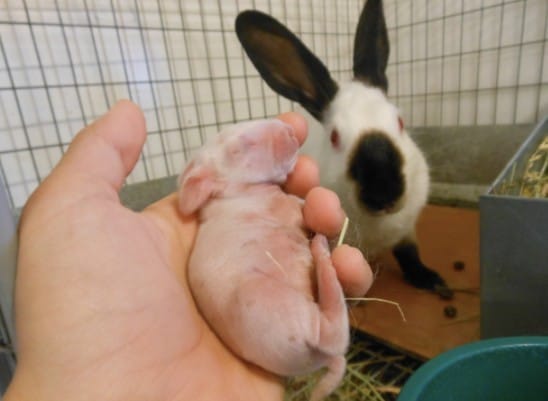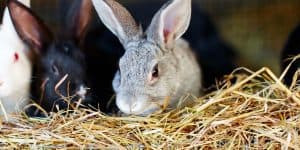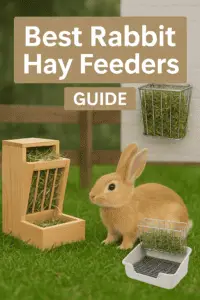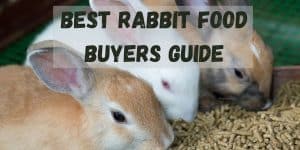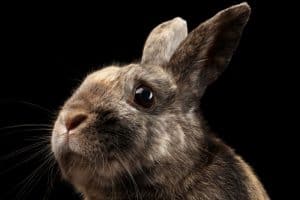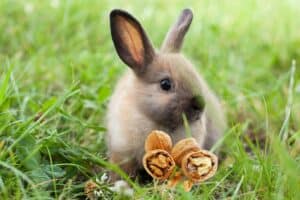With an average gestation period of around just one month, the average rabbit doe can hypothetically give birth up to 12 times a year; with each litter consisting of anywhere from 1 to 14 baby bunnies.
So, why do rabbits eat their young?
Despite their cute and innocent facade, however, there’s an interesting, but quite disturbing phenomenon that long-time rabbit breeders have witnessed at least once: Rabbits eat their young.
There are many purported reasons for this strange phenomenon. But unfortunately, no knows for sure exactly why it happens. In this article, we’ll explore some possible reasons and list down 3 ways to prevent it from happening.
Table of Contents
Why rabbits eat their young
A mother animal eating its own babies is not really unheard of in the animal world. That doesn’t mean it’s something that we can easily accept.
For humans, even just hurting your own children is despicable. For animals, though, it’s a whole ‘nother story.
Truly, rabbits eating their own young sounds like something straight out of a horror movie, but it does happen.
Fight or flight
In the case of wild rabbits though, it’s somehow understandable.
Wild rabbits, with their small size and peaceful disposition, are at the bottom portion of the food chain. Larger birds and animals, such as lions, crocodiles, and eagles, are always hunting them.
Rabbits have already developed their senses enough to avoid most of these predators, but in cases where they need to choose fight or flight, it’s always the latter for them.
Now, imagine a mother rabbit with a litter of six tiny kits being hunted down by a predator. Even if those babies are only a couple of days old, there’s a huge chance that the rabbit is already pregnant with the next litter.
What would you do if you were in the mother rabbit’s shoes? Fight the predator and die a certain death?
Or hide all traces of your presence and live to give birth to your next litter?
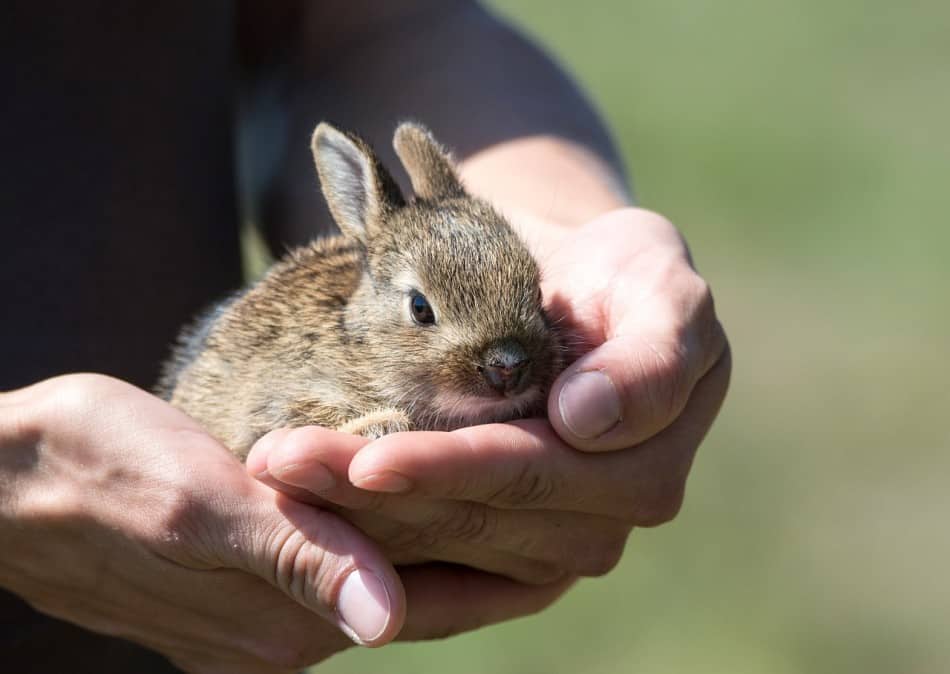
For most, if not all, wild rabbits, the answer is obvious: Gobble up the kits and destroy all evidence in the process. This allows her to flee freely from the predator, thus surviving another day.
For domesticated rabbits, the instinct to eat their young in the face of danger is already rooted deep. So much so that they still do it even if there’s no more wild tiger to catch them.
Survival of the fittest
That’s not the only reason why rabbits eat their young, though. At times, mother rabbits may also eat their kits if they think that they’re all suffering from some sort of illness.
Experts speculate that this is in order to reduce their suffering since they won’t be able to survive for long anyway.
How to prevent rabbits from eating their young
If you’re trying to breed rabbits, a mother rabbit who keeps trying to eat her young can indeed be a huge nuisance.
Plus, it’s absolutely disturbing to find out that your pet rabbit, your cute and cuddly furry little creature, has completely gobbled up her entire litter, all of which came from her.
Here are three ways that you can prevent it from happening again.
1. Make her feel secure
As discussed above, the main reason why many rabbits eat their young, even domesticated ones, is because of their natural instinct. Since the response to that instinct is to eat their young, you should tackle the root problem in the first place.
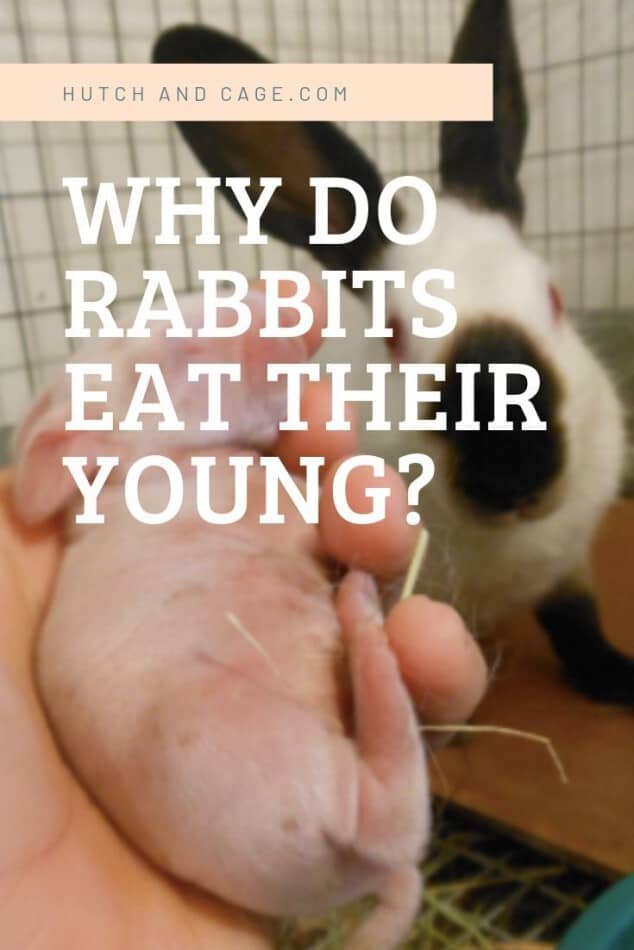
Ask yourself this: why is that instinct kicking in? Is there anything threatening her in her enclosure? What can you do to help alleviate her fears?
If this is the main issue with your rabbit, do your best to make her feel secure enough to keep the babies.
This includes creating a small hiding place for her and the kits that is dark and away from high-traffic areas in your rabbit enclosure.
Doing so could help make her feel more safe.
2. Keep the doe away from the kits
If you already did your best to make her feel more secure and yet she still attempted (or actually succeeded) to eat her newborn kits, perhaps it’s better to keep them away from each other, at least until they’re a few weeks old.
First, create a nest box where the babies will be comfortable, preferably with some hay and paper shavings.
Here are a few nesting boxes available from Amazon.





Next, put the nest box in a cage with a door that can be closed. This is so that the mother won’t be able to access them.
You should still let her feed the kits at least once or twice a day though, under careful supervision, of course.
3. Distract her with other food or toys
Now, if you’ve tried the other two methods and it still seems like the mother rabbit is dying to eat her own babies. It’s time to focus more on the mother now, particularly if it’s her first time of giving birth.
Mother rabbits tend to get really stressed right after giving birth. Their senses are heightened and working all the time and the overwhelming responsibility of motherhood resting on their shoulders.
Seriously, even a rabbit doe can get overwhelmed after giving birth for the first time. Sounds a lot like humans, huh?
If you’re encountering this problem, try to distract her with other food or toys. This does two things: one, it entertains her which reduces her stress and two, it helps remove her attention from her babies.
You might also want to change her diet, as some breeders say that feeding extra calcium to their pregnant or recently-birthed rabbit mothers help calm them down greatly.
Keep doing this until you notice that the mother rabbit is no longer as stressed out as before.
Conclusion: Why do rabbits eat their young?
Just because a rabbit ate its young doesn’t mean that it’s automatically evil. Sometimes, it’s all just a matter of instinct.
You can prevent rabbits from eating their young by helping the rabbit mother feel more secure or distracting her with other things so that she’ll stop focusing so much on her babies.
You might also want to consider separating her from her babies while they’re still small and vulnerable.
Here’s to hoping that you’ll never see another rabbit eat its young again!

